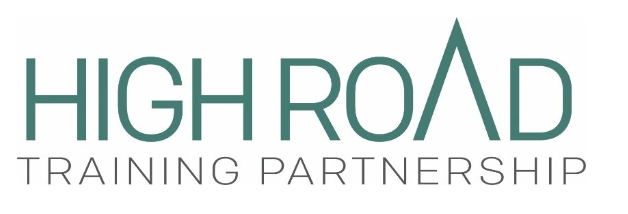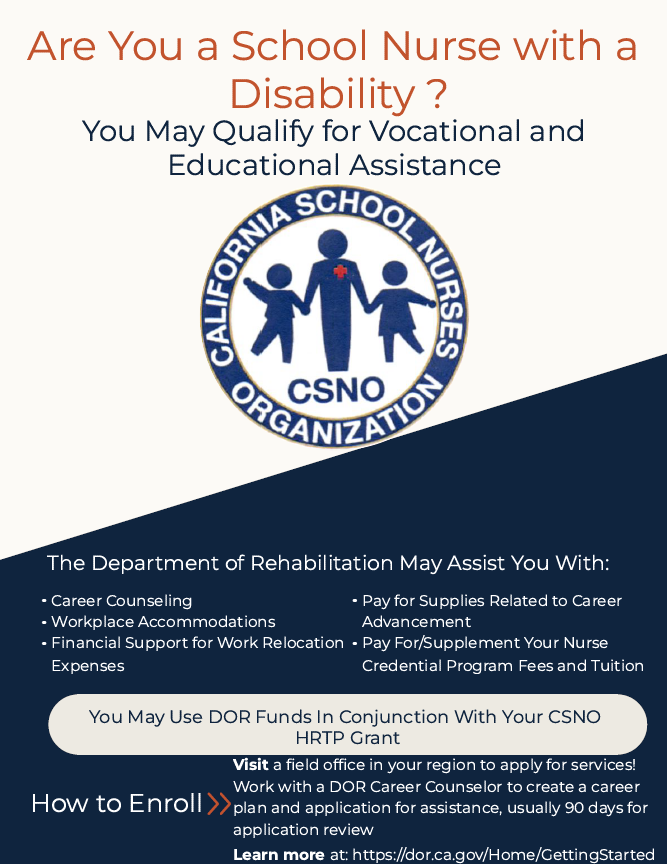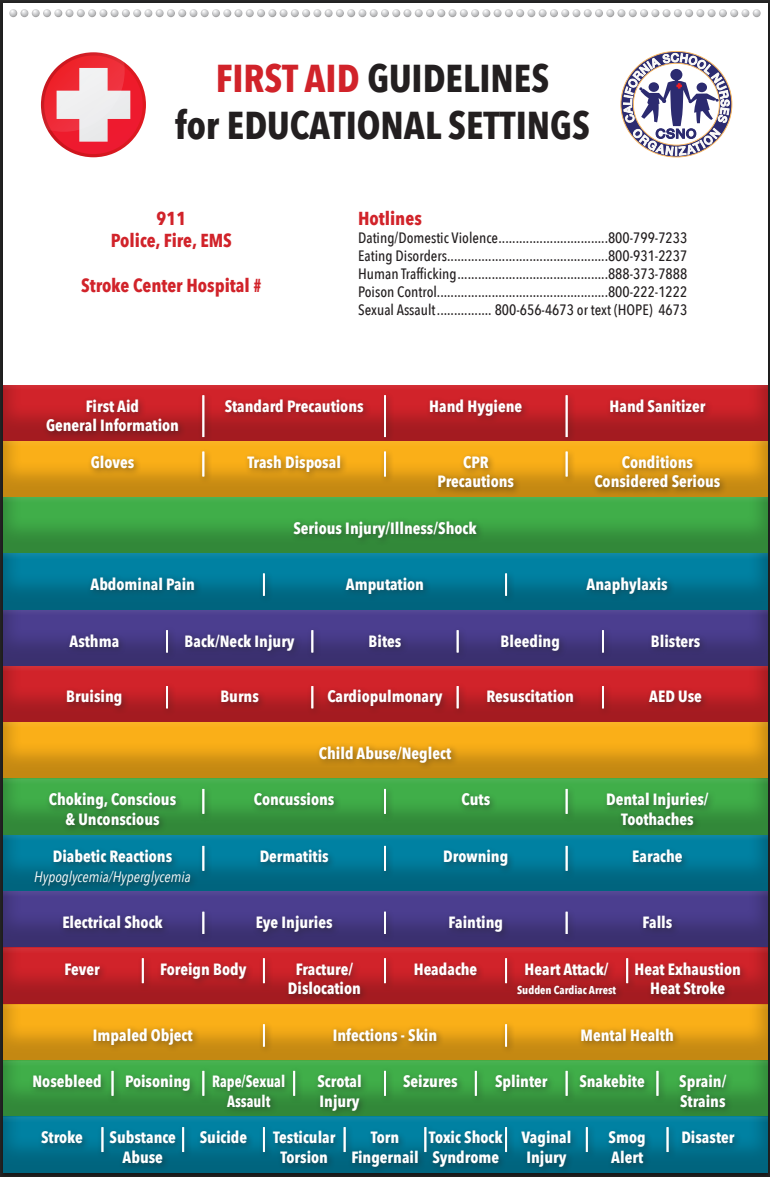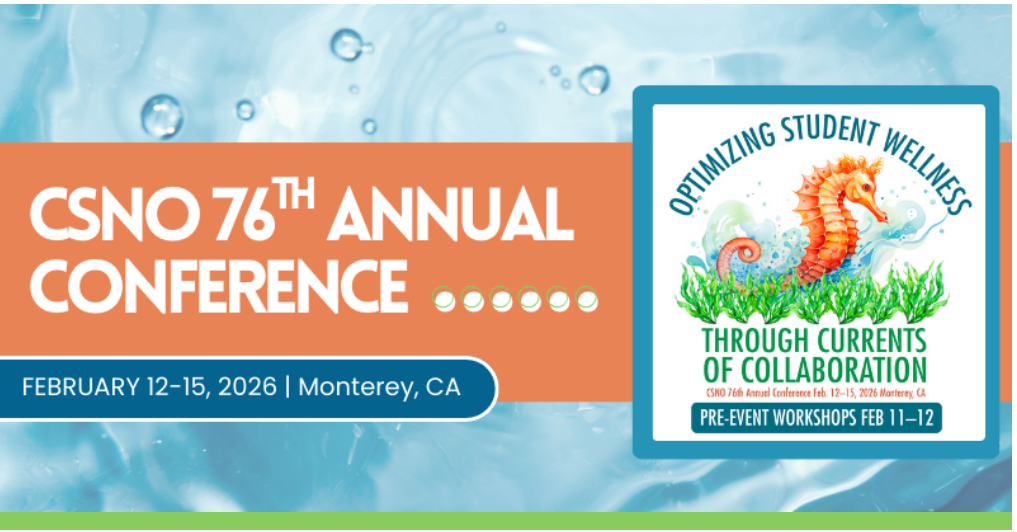
CSNO Spring Conferences
Central Valley Section Spring Conference
Saturday, March 14, 2026; Hybrid; 8:20-3:45
Topics:
Improving Student Attendance
Home Hospital Instruction
Career Pathways to Nursing
CSNO Members $55
CSNO Student, Retired and Board Members $45
Non Members $55
5.5 CECUs for full attendance.
Bay Coast Spring Conference
April 25, 2026: Zoom; 8:30-1:00
Topics:
Common Childhood Conditions
ENT and Skin issues in school-age children
Dr. Madelyn Taylor, Pediatrician, UCSF Children's Benioff Oakland Children's HospitalLyme Disease-Jo Ellis, Director of Education at Bay Area Lyme Foundation
CSNO Members $30
CSNO Student, Retired and Board Members $25
Non Members $35
3.0 CECUs for full attendance.
April 18, 2026
Southern Section Spring Conference
Save the Date
Topics:
Mental Health
IEP Processes
Registration & Details Coming Soon
25-26 CSNO Happy Hours!!!!

Hearing Aid Coverage for Children & Hearing Conservation Program
March 12, 2026; 2:30-4:00p.
Presenters: Lauren Gordon and Lorenzo Almanza
AI and School Nursing
March 25, 2026; 2:30-4:00
Presenters:
Marci McLean-Crawford, MSN-NI, M.Ed, BS.Kin, RN, PHN, RCSN, CPT, CLE
Sarah Hacker, MSN, RN, NCSN, PHN, RCSN
LEA Medi-Cal Billing Option Program and Children's Youth Behavioral Health Initiative (CYBHI) and School Nurse Reimbursement
April , 2026
Katie Nilsson, MSN, RN, PHN, CPN, RCSN
Registration Coming Soon
Brag about A Colleague: Evidenced-Based Practices In School Nursing
May 19, 2026; 2:30-4:00
Dawn Anderson, MS, RN, PHN, RCSN & Sheri Coburn, EdD, MS, RN, PHN, RCSN-Facilitators
CSNO offers 1.5 hours of CA Board of Registered Nursing Contact Hours. The California School Nurses Organization is an approved provider of Contact Hours by the California Board of Registered Nursing CEP #04269.

For updates or questions about the High Road Training Project, please click on the tab below. We will continue to post updates there. For more information and to apply please click below
Update November 18, 2025-Cohort 2 Winter 2026 Candidates announced
Round 2 candidates for the High Road Training project were selected for CSU, Fresno and Sacramento. In a highly competitive process the HRTP selection committee have been tasked with some very difficult decisions. Between the two programs, there were 35 HRTP slots available with over 110 school nurse applicants. The grant criteria includes identifying high free and reduced lunch areas, compelling candidate need, rural location, diverse candidacy as well as other factors. You must apply to the school nurse program and the HRTP funding at the same time in order to be considered.

|
CDPH School Health Update Meeting & Office Hours (2025/26)
Date & Time: Mar 10, 2026 02:00 PM in Pacific Time (US and Canada)
Ready Together: Building Safer Schools Through Emergency Preparedness
Hosted by the CDPH Office of School Health in partnership with the California School Nurses Organization (CSNO).
This 1-hour webinar is designed for local education agencies (LEAs), local health jurisdictions (LHJs), school nurses, and other school health professionals seeking practical, policy aligned strategies to strengthen school emergency preparedness. You’ll gain actionable tools to coordinate across agencies, conduct effective debriefs, and support continuous quality improvement—so your teams are ready before, during, and after an emergency incident. After the webinar, participants will be able to:
Develop, implement, and evaluate comprehensive school emergency preparedness plans aligned with Education Code and local requirements.
Strengthen coordination with key partners—local emergency management, first responders (law enforcement, fire, EMS), public/environmental health agencies, and NGOs such as the California School Nurses Organization and Child Life Disaster Relief—to enhance response and recovery.
Conduct effective debriefs and after-action reviews by identifying strengths, improvement opportunities, and secondary victim considerations through district processes that support quality improvement.
Duration: 1.5 hour webinar with 10-minute Q&A. For registered school nurse attendees, CSNO is offering 1.5 contact hour from the California Board of Registered Nursing for this learning experience.
The California School Nurses Organization is an approved provider of Contact Hours by the California Board of Registered Nursing CEP #04269.
Who should attend: District and school administrators, school nurses, emergency managers, LHJ partners, and anyone responsible for safety planning and incident response. Thank you for your dedication to championing student health and safety, Office of School Health
CSNO State Adolescent Health Specialty Practice Chair Vacancy
CSNO is excited to share a vacancy for the State Adolescent Health Specialty Practice Chair. This position is a 2 year commitment 2026-2028. The CSNO State Adolescent Health Specialty Practice Chair serves as a leader for school nurses practicing in adolescent health areas. In addition to serving on the CSNO State Board, you will be asked to work with the section counterparts in information dissemination on adolescent health issues. Approximate Time commitment:
8 monthly CSNO State Board Meetings 2 hours in length virtually
1 CSNO Leadership Summit 2 days in length (July 16-18) In person
1 CSNO Conference 2 days to assist with room hosting and identifying speakers In person
3 meetings with section adolescent chairs 1 hour virtually.
It is desirable that the candidate work with adolescents in your current school practice, which may include 5th grade and up. For questions please email Sheri at [email protected].
Please submit your interest by March 4, 2026
Spring School Nurse Academy Announced
April 20 & 22, 2026
CSNO is please to launch the final school nurse academy for the 25-26 school year. The School Nurse Academy is a hybrid learning experiences for new or seasoned nurses. Held virtually and then via online learning modules, the Academy fosters connections with school nurse members. The virtual academy is facilitated by experienced CSNO School Nurse members who serve on the CSNO State Board. With the exception of the virtual moments, the online learning is comprised of self-paced, independent learning experiences. Each module varies in length but offers contact hours respective to the amount of time
for module completion.
CSNO members: $650
Non members: $774
Student Nonmembers: $712
HRTP Grant Recipients-Complimentary registration
CSNO is pleased to offer 5 contact hours for first virtual
School Nurse academy CEP#04269
The California School Nurses Organization is an approved provider of Contact Hours by the California Board of Registered Nursing CEP #04269.
2026 CSNO First Aid Flip Chart
Makes it's Debut!
In an exciting revamp, CSNO is delighted to unveil the 2026 First Aid Flip Chart; a product CSNO has offered since 1997. This handy updated product provides instant information on what to look for and provides insight into next steps. Used statewide, this vital resources supports school offices, expanded learning programs, field trips and other school related event personnel on next steps in the event of a injury. Colorful, sleek, and informative, you won't want to miss this opportunity before we sell out. CSNO is taking pre-orders now! CSNO Members enjoy a significant discount at $30/chart savings.

California State School Nurse Consultant
Position Posted
Great news!
Here is the posting for the Nurse Consultant position: CalCareers.
Job Posting: Nurse Consultant III (Specialist)
Department of Education JC-497700
NURSE CONSULTANT III (SPECIALIST)
$8,567.00 - $11,329.00 per Month
Final Filing Date: Until Filled
Job Application Package Checklist
The following items are required to be submitted with your application. Applicants who do not submit the required items timely may not be considered for this job:
https://calcareers.ca.gov/pdf/std678.pdf
- All Experience and Education relating to the Minimum Qualifications listed on the Classification Specification should be included to demonstrate how you meet the Minimum Qualifications for the position.
- Resume is optional. It may be included, but is not required.
- Degree and/or School Transcripts
- Statement of Qualifications -
Interested individuals MUST submit a Statement of Qualifications (SOQ) with their application. Resumes, letters, and other materials do not take the place of the SOQ. The SOQ should have a title of “Statement of Qualifications, Your Name,” be no more than 1 page, no smaller than 12-point font, and address the following:
- Provide a brief background of your experience working as a school nurse, and what qualifications you bring to the position to support the health and wellness of the school com munity.
- Other - Cover Letter
- Other - School Nurse Services Credential
Applicants requiring reasonable accommodations for the hiring interview process must request the necessary accommodations if scheduled for a hiring interview. The request should be made at the time of contact to schedule the interview. Questions regarding reasonable accommodations may be directed to the EEO contact listed on this job posting.
Duty Statement
Nurse Consultant III (Specialist)
Positions at this level function as nonsupervisory technical specialists in difficult and/or sensitive program and policy development or in a coordinating role where the level of expertise required is definitively greater than that for any other supervisory position at this level. Incumbents serve as highly skilled technical program consultants, or as recognized authorities in areas of extreme sensitivity or complexity, or in areas of high specialization. Typically, incumbents have statewide responsibility for the nursing and related components of a major statewide program with coordinating or lead responsibility for nursing and other professional/technical staff. Under general direction, incumbents provide the most complex, difficult, and sensitive consultation; develop, plan, organize, coordinate, implement, and evaluate the nursing and related components of a major statewide program; evaluate and ensure statewide program consistency; provide professional guidance to nursing and other health professional staff; and do other related work.
CSNO is willing to review your resume/vitae and provide feedback. Your resume must mirror the expectations of the job as well as the Duty Statement. Please send to [email protected]
Minimum Qualifications-Please include in your resume/vitae
1. Possession of an active valid license as a registered nurse in California.
2. A baccalaureate or higher degree in nursing from a school of nursing accredited by the National League for Nursing (NLN) or its equivalent for foreign graduates or California State Public Health Nurse Certificate may be substituted for the baccalaureate in nursing
3. A master's degree in a health-related field such as: nursing, public health, health care services, health care administration, or hospital administration.
4. Two years of professional registered nursing experience which must have included responsibility for health services program planning and implementation or an administrative, consultative, teaching, or supervisory capacity.
5. Four years of professional registered nursing experience, at least two years of which shall have been in an administrative, consultative, teaching, or supervisory capacity. (One additional year of graduate work in group dynamics, interpersonal relations, or other courses relating to the consultative process in nursing may be substituted for one year of the required general nursing experience.)
6. Management problem-solving methods; principles and methodology of research; current trends in the fields of nursing education and health care services; interagency and interdisciplinary relationships.
|








